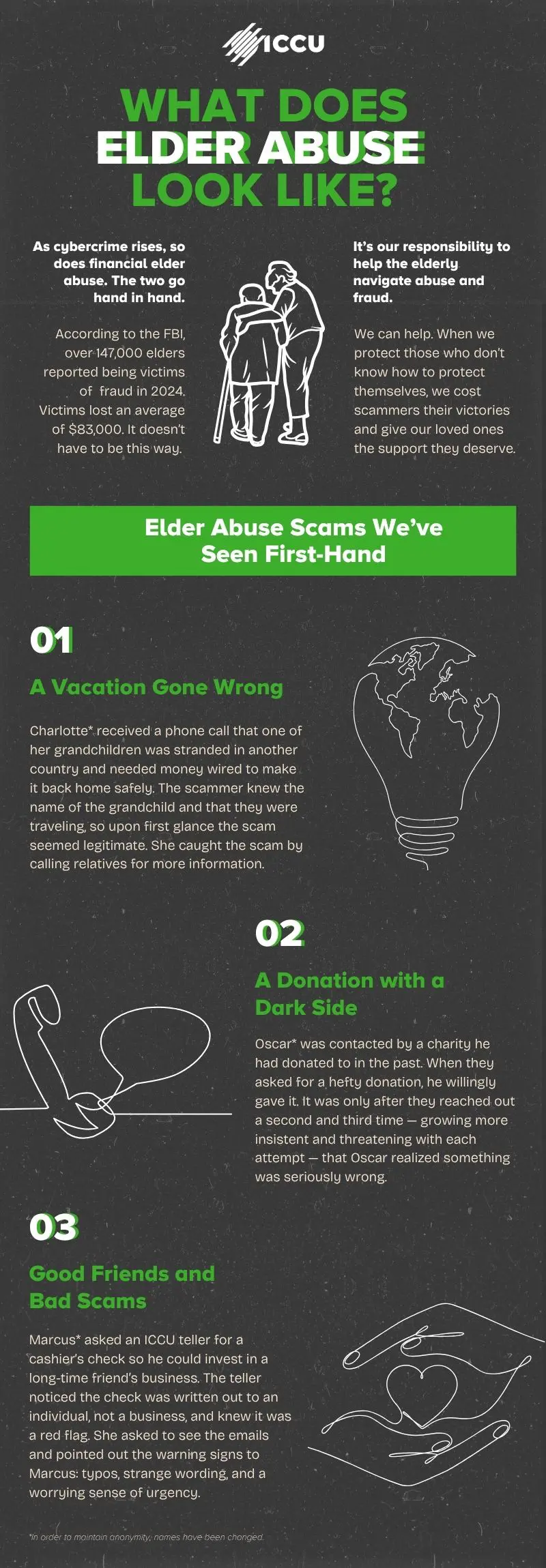It’s not exactly fun to imagine abuse, particularly when it comes to your loved ones. Unfortunately, as other worrying cybercrime statistics rise, so does the threat to our elderly. According to the FBI’s Elder Fraud Report, over 147,000 people were victims of elder fraud in 2024. Each victim lost an average of $83,000. Those numbers only grow with each passing year.
While there’s no denying elder fraud is a growing problem in the US, we can still do so much to counter it. Whether you have elderly loved ones in your life, are elderly yourself, or simply want to learn how to combat fraud, this article is for you.

What is elder fraud?
Elder financial abuse, or elder fraud, is a distinct form of exploitation that targets older adults, age 60 or older. Offline, perpetrators are often people in positions of trust, such as caregivers and family members. Online, it can be anyone.
Unlike general financial scams, elder fraud specifically takes advantage of the benefits, vulnerabilities, and dependencies that come with aging. Whether true or not, many fraudsters believe the elderly have more assets and money than the average person. That, combined with potential vulnerabilities like cognitive decline, makes elderly people a convenient target for fraud and abuse.
Perpetrators tend to have access or authority over the victim’s finances through powers of attorney, joint accounts, or scams. Elder abuse can involve misuse or theft of money, assets, and even property.
While victims are specifically targeted for their money and assets, the impact goes beyond financial loss — elder abuse can severely undermine someone’s independence, security, and quality of life.
Why do scammers target the elderly?
There are several reasons why elders tend to be more prone to financial abuse:
Accumulated Assets
Seniors tend to have accumulated assets and savings over their lifetimes, and this makes them attractive financial targets.
Cognitive Decline
Cognitive impairment can affect judgment and make the elderly less able to detect fraudulent schemes.
Increased Trust
Elderly people tend to be more trusting and polite, increasing their susceptibility to scams.
Poor Technology Skills
According to recent studies, people aged 65-76 years old are often eager to adopt new technology but are apprehensive about the lack of instructions, clarity, and support. Because elderly have less online prowess, they tend to fall into online scams more often than younger adults.
Loneliness and Social Isolation
Scammers can easily exploit a senior’s desire for companionship because the person has felt emotionally or psychologically isolated for some time.
Shame and Fear
Seniors are often too ashamed to report the crime, allowing scammers to continue operating. According to the National Adult Protective Services Association (NAPSA), only about 1 in 44 cases of financial elder abuse are reported.

How can we protect our elderly loved ones from financial abuse?
The best methods come through a combination of awareness, vigilance, and empowerment:
Educate Seniors
We should educate seniors and families about the most common financial exploitation tactics, including identity theft, scams, and influence by trusted individuals. It’s also crucial to educate seniors on technological aspects that may be unfamiliar to them. Increasing awareness of financial abuse can go a long way in protecting our loved ones.
When educating the elderly, lead with questions before advice. Some elderly are adept at technology while others struggle. Some understand the risks of sharing personal information over the phone but aren’t aware of the risk of online data breaches. Ask your loved ones what they need clarity on, then offer advice that works for them.
If they’re not sure where to start, begin with the invisible side of the internet — firewalls, URL tracking, that sort of thing. (Not sure what a URL tracker is or how to read a URL? Read this article!)
Promote Social Connectedness
Isolation is a major risk factor for financial exploitation, just as genuine social connectedness acts as a buffer. Many elderly people are manipulated into giving away information and money because they’re searching for companionship.
If you have an elderly loved one, reach out to them regularly. Ask them how they’re doing. Encourage them to strengthen community and family connections. It may seem like extra socializing is an added risk, but every friend made is another person who can spot the signs of elder abuse before it happens. Where isolation and dependency breed manipulation, community and companionship breed resilience.
Add a Trusted Contact to Bank Accounts
Encourage your loved one to add a trusted contact to their financial accounts. Whether that person is a friend, neighbor, or family member, they should be someone the elderly person trusts, has known for years, and stays in regular contact with.
This person does not need to have access to the account details but should know how to reach the account holder. Many financial institutions recommend naming multiple trusted contacts in case one is unavailable. That way, the financial institution can contact this person if they suspect financial exploitation or have concerns about the account holder’s well-being or capacity.
Monitor for Red Flags
There are several signs that could indicate elder abuse or financial fraud. If you notice any of these signs in your loved one’s behavior, speak with them immediately:
- New “best friends” who are always in contact, particularly if they’ve never met in person or seclude them from their other loved ones.
- Unpaid bills.
- Unusual cash withdrawals or payments that are out of character or unrecognized.
- Added reluctance from the elderly individual to discuss finances.
Simplify the Person’s Finances
Simplifying finances for seniors minimizes opportunities for financial misuse and elder abuse in a number of key ways:
- Fewer accounts limit points of access, reducing exposure to potential identity theft or account takeovers.
- Consolidating accounts provides a comprehensive view of total assets and transactions, making it easier to monitor for suspicious activity.
- Having multiple accounts across different institutions increases the risk of oversight and potential exploitation.
- Centralizing finances in one location increases the likelihood of developing a relationship that could detect potential abuse.
Consult with Trusted Legal and Financial Professionals
Powers of attorney, financial advisors, and other professionals can be invaluable when it comes to preventing elder abuse:
- It allows the person to make decisions about their finances while they have full mental capacity.
- Protective measures provide safeguards that become difficult to implement after their cognitive decline.
- These arrangements provide a framework of accountability, making it harder for potential abusers to improperly access or mishandle the individual’s money.
- Financial trusts can include provisions to protect assets from misuse and appoint independent trustees to oversee finances.
- Working with financial advisors and qualified attorneys ensures these arrangements are established in the person’s best interests and not under any undue influence.
Remember, those with legal and financial power over the elderly are some of the biggest perpetrators of elder abuse, so it’s critical they choose someone they’ve vetted and trust.

The Bottom Line on Preventing Elder Fraud
The more we care for our seniors, the less scammers succeed. It’s that simple. If you want to ruin a scammer’s day, talk to the elderly people in your life. Find out their pinch points with technology and finances. Give them someone to confide in. And, of course, if you learn someone in your life has been abused, report it immediately.
This fight is personal, and it’s time we treat it that way. The elderly people we love are the most at risk, and it’s our turn to protect them. By checking on and educating the people you love about elder abuse, you fortify them against fraud.



